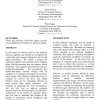Free Online Productivity Tools
i2Speak
i2Symbol
i2OCR
iTex2Img
iWeb2Print
iWeb2Shot
i2Type
iPdf2Split
iPdf2Merge
i2Bopomofo
i2Arabic
i2Style
i2Image
i2PDF
iLatex2Rtf
Sci2ools
123
click to vote
GAMEON
2000
2000
Emotional States and Realistic Agent Behaviour
In this paper we discuss some of the relations between cognition and emotion as exemplified by a particular type of agent architecture, the CogAff agent architecture. We outline a strategy for analysing cognitive and emotional states of agents along with the processes they can support, which effectively views cognitive and emotional states as architecture-dependent. We demonstrate this architecture-based research strategy with an example of a simulated multi-agent environment, where agents with different architectures have to compete for survival and show that simple affective states can be surprisingly effective in agent control under certain conditions. We conclude by proposing that such investigations will not only help us improve computer entertainments, but that explorations of alternative architectures in the context of computer games may also lead to important new insights in the attempt to understand natural intelligence and evolutionary trajectories.
Related Content
| Added | 01 Nov 2010 |
| Updated | 01 Nov 2010 |
| Type | Conference |
| Year | 2000 |
| Where | GAMEON |
| Authors | Matthias Scheutz, Aaron Sloman, Brian Logan |
Comments (0)

